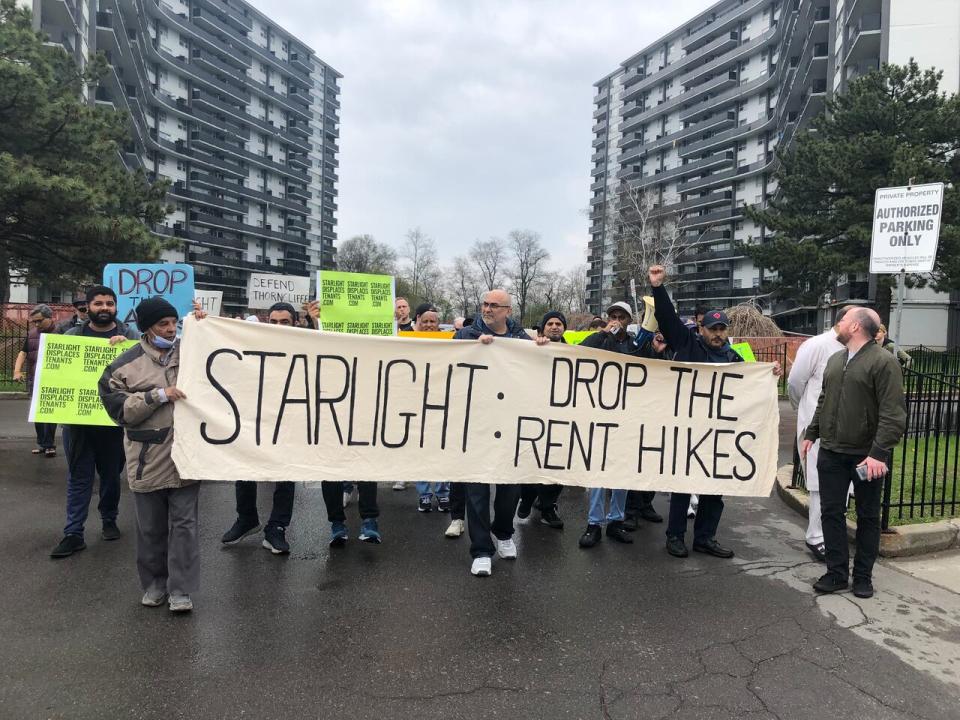Striking tenants mark one year of withholding rent from landlords

Striking tenants in Thorncliffe Park marked almost one year of withholding rent Sunday in protest of above guideline rent increases (AGI) applications for their buildings.
Tenants in 71, 75 and 79 Thorncliffe Park Drive gathered in front of their buildings to send a message to their landlords Starlight Investments and PSP Investments that they aren't going to stop until those applications are withdrawn — despite the eviction notices they've been served.
Sameer Beyan has been living in one of the buildings for the past eight years. He said the increase, if allowed, would mean an extra $100 dollars out of his wallet each month — a significant blow to his family's savings.
"It would be quite devastating," he said, adding he lives with and takes care of both of his elderly parents.
He said costs for renovations shouldn't be passed down to tenants.
"For us, we're barely even able to afford rent. What we need is more affordable rent and for the landlord to withdraw the above guideline rent increases."

Sameer Beyan has been withholding rent for his Thorncliffe Park Drive apartment building for almost one year now. His goal is to convince his landlord, Starlight Investments, to withdraw its application to raise rents above the provincial guideline. (Spencer Gallichan-Lowe/CBC)
In Ontario, landlords can increase rent by 2.5 per cent each year without applying to the Landlord and Tenant Board (LTB). Striking tenants like Beyan say any increase above the cap, amidst an unaffordability crisis, disproportionately impact renters already feeling the squeeze of the housing market.
But the landlord says they're following all provincial laws in pursuing the AGIs, which help cover costs related to combating the buildings' aging infrastructure.
Landlord says its made investments into buildings
The buildings are owned by Starlight Investments and the Public Sector Pension Investment Board (PSP Investments), which is a Crown corporation and one of Canada's largest pension investment managers.
PSP Investments directed CBC Toronto to Starlight for comment, saying Starlight handles the day-to-day operations.
According to an email to CBC Toronto from Starlight Investments, the company is waiting to hear back from the Landlord and Tenant Board if their projected increases, which vary from 5.33 to 6.37 per cent depending on the building, will be approved.
They say the increases apply to completed capital projects in the buildings, such as structural changes to the building's exterior, balcony restoration and retrofitting lighting.
"Starlight Investments is committed to ensuring the longevity of our existing residences and building new homes across Canada," reads a statement from Penny Colomvakos, the vice president of residential operations.
She said the company invested more than $28.5 million in improvements to the buildings since acquiring the properties in 2019.
"We have made capital investments to ensure the aging infrastructure can continue to be a safe and welcoming place for more than 1,000 residents to call home."
The company confirmed 86 people are currently striking, and said they've ordered them to make their payments to the LTB while they await a hearing. It said all residents are eligible to apply to their rent relief program, but none of those withholding rent have applied.
WATCH | How far this tenant is willing to take the rent strike:
Despite the investments, tenant Iqbal Dar said he's watched his unit fall into disrepair, with water seeping through his walls. He says he's still waiting for an exhaust to be put above his stove, even though he flagged the matter years ago.
"You keep complaining [to] them, and really we didn't go anywhere on those matters," he said.
Stakeholder, expert weigh in on impact of AGIs
Tony Irwin, the president and CEO of the Federation of Rental Housing Providers of Ontario, said above guideline increases help pay for major projects that often cost millions of dollars.
He said the province is approaching the vast majority of its rental stock being built before 1980, making it "not surprising" that buildings are in need of more substantial repairs.
"Even though an above guideline increase might be a challenge ... these are still the most affordable rental units that we have, and so it's important that we preserve them."
Irwin says there needs to be a "balance" between tenant protections and housing providers, which are often times private companies, to create a "viable" industry.
But Nemoy Lewis, an urban and regional planning assistant professor at Toronto Metropolitan University, said while old buildings may be in need of renovations, corporate landlords may be targeting these buildings to generate "a much higher return" compared to investing in newer property.
Additionally, he said AGIs are often pursued in places where there are "massive improvements" being made in the surrounding infrastructure.
LISTEN | Why some Thorncliffe Park residents worry they're left out of local development plans:
"They're helping to ... stimulate the gentrification problems in some of these vulnerable communities," said Lewis.
"These motivations are helping to exacerbate the affordability problems of fixed and low-income renters that are currently residing in some of the last remaining affordable pockets of our city."
He pointed to other tenants from different parts of the city who have launched their own rent strikes, saying they may only become more popular as landlords initiate AGI applications.
"They definitely have the potential to create transformative changes in terms of the recognition of the right to housing for all Canadians," he said.

